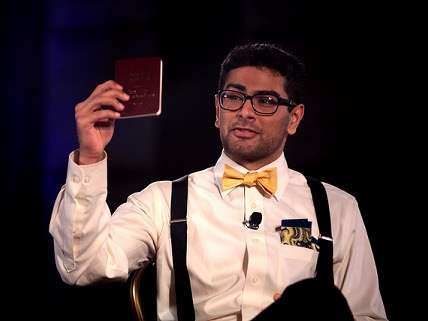At U of Michigan, a Muslim Student Unmasks the Hypocrite He Says Vandalized His Apartment
The perpetrator was a liberal activist and decorated campus Muslim leader who said American Sniper promoted violence.


Is the University of Michigan a hostile place for Muslim students—or just a hostile place for freethinkers?
Zeinab Khalil, a recent UM graduate, Muslim, and progressive activist who won numerous distinctions during her time on campus, including an award named for Martin Luther King, Jr., thinks it's the former. A UM group's decision to screen the film American Sniper offended the sensibilities of some Muslims, including Khalil, who claimed on Twitter that the campus "is already a hostile place for Arab/Muslim students. In one tweet posted on April 9th, she despaired:
"Spent 4 yrs at @umich doing anti-oppressive work; admins used me to educate campus. this is what i get in return as exhausted/exploited alum."
In a sense, she's right. UM has indeed proven to be a hostile place for at least one Muslim student: Omar Mahmood, whose off-campus apartment was vandalized last December by a trio of women who pelted his door with eggs and left him hateful messages because they didn't appreciate a satirical column he'd written mocking trigger warnings and microaggressions.
Who perpetrated this act of intimidation against a Muslim student? It was Khalil herself, according to Mahmood, whose account is supported by the testimony of other students, video footage, and emails obtained by Reason.
Khalil was assisted by two others, according to Mahmood, who are also recent graduates and progressive activists in the UM Muslim community.
Mahmood has known this all along—the amateur criminals were caught in the act on the apartment complex's surveillance video and are identifiable to those who know them—but he says he didn't report their names to the media in hopes that they would reconcile with him privately. They never did.
In the wake of the controversy over American Sniper and Khalil's statements about campus hostility toward Muslims, Mahmood says he couldn't hold back any longer.
At 1:40 a.m. on Friday, December 12, 2014 the three women entered Mahmood's building. They vandalized the door leading to his apartment unit, pelting it with eggs, gum, and hot dogs, and left hateful messages such as "You scum embarrass us," "you have no soul," and "everyone hates you you violent prick." They also left a picture of Satan and defaced copies of the thing that had drawn their ire: a satirical column he had written for the campus's conservative alternative newspaper, The Michigan Review.
The column, titled "Do the Left Thing," was written from the perspective of a left-handed student up in arms about all the microaggressions right-handed students had committed against him. Mahmood lamented political correctness in the piece:
It is 2014, people. Still, change starts with awareness. Until right-handed people, especially cis-gendered hetero white males in salmon shorts, do not start checking their privilege, we will continue to live in inequality.
That was enough, says Mahmood, to provoke Khalil.
But even though the perpetrators were caught in the act on surveillance video and their identities were known to many on campus, according to Mahmood, no official action or reprimand took place. And despite the incident garnering attention from national news media—both Fox News and New York Magazine cited it as a prime example of the culture of censorship at the modern American university campus—Mahmood never received any kind of apology. Leaders of the UM Muslim community tried to mediate, but the women were unwilling to meet.
"They have not apologized," Mahmood told Reason.
Khalil's tactics are all the more astonishing given her level of distinction and importance on campus. During her time at UM, she was a model leader with a considerable resume. She was a student commencement speaker for the Honors Program graduation ceremony in May 2014, president of the Muslim Student Association, a columnist for the main campus newspaper, The Michigan Daily, and founder of several activist groups. The university chose her as a Rhodes Scholarship nominee last September—just a few months before Mahmood's door was vandalized. She even received the Dr. Martin Luther King Jr. Spirit Award for exemplifying "the leadership and extraordinary vision" of King, an apostle of non-violence. She interned at the Century Foundation and the Brookings Institution, both left-leaning think tanks in Washington, D.C.
Khalil did not respond to repeated telephone calls, voicemail messages, and emails seeking comment on their actions. Reason obtained messages between a UM employee with knowledge of the incident and the people involved; these documents support Mahmood's assertions. An individual who spoke to Reason on condition of anonymity recognized the women from the surveillance footage and said there was no doubt of their identities.
The Michigan Review has also reported that Kahlil took part in the vandalism and was investigated by the UM Dean of Students over the matter last year.
University administrators are committed to a "diverse, open, and friendly campus," according to The Michigan Journal, which reported that President Mark Schlissel believes all students should be able "to express their opinions openly." Much lip service is paid to the idea that college is a place for tolerance of diverse viewpoints.
Why then did the attempted intimidation of a student—particularly one belonging to an ethnic, political, and religious minority—go unanswered by officials? Rick Fitzgerald, director of the Office of Public Affairs at UM, told Reason that the administration's hands were tied. Mahmood never filed a bias complaint, so the university had no grounds to take action, he said.
"Violations of the Statement of Student Rights and Responsibilities are initiated by complainants who bring forward certain facts in the form of a complaint," said Fitzgerald.
Mahmood told Reason that he called the university hotline to report a bias incident, but was informed that because it had occurred off campus, nothing could be done.
Mahmood's situation is interesting because muted responses to bias incidents—even unofficial ones—are atypical, at UM and other colleges. Indeed, at UM the administration acted swiftly when the feelings of certain Muslims were at issue. After hundreds of students sign a petition demanding that UM cancel a planned screening of American Sniper, organizers substituted Paddington—a film starring an anthropomorphic bear, based on a children's book—in its stead. Criticized for caving to some students' hurt feelings, officials changed their minds and decided to show both films.
Where was the outcry over Mahmood's door?
Derek Draplin, a UM student, editor of The Michigan Review, and friend of Mahmood's called his treatment "completely hypocritical."
"The Muslim community on campus has basically excommunicated him for not adhering to their dogmas," he told Reason. "They preach tolerance, then try to shut any dissenters up."


Show Comments (606)